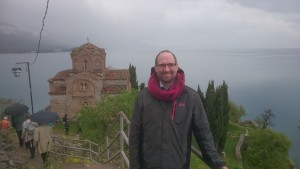Manfred attended the 6th General Meeting of the European network Parseme (Parsing and Multiword Expressions) in Struga, FYR Macedonia.

Manfred presented joint work with Stella Markantonatou (ISLP, Athens), which originated from Manfred’s research visit in Athens last October. Stella and Manfred look at Affectees in Multiword Expressions: German and Modern Greek. In both languages, an optional obligue complement can be used to express a participant that is affected by the described event. Very often this affected participant is a so-called external possessor of one of the other participants. For this reason we often find an alternation between the occurrence of such an oblique argument with a definite NP that encodes the possessum and a possessum-NP that contains the possessor in the form of a genitive or possessive pronoun.
Looking at 150 idioms from each German and Modern Greek, Stella and Manfred observe that (i) if an oblique participant occurs, it has the interpretation of an affectee, just as in free combination, (ii) however, the possessor alternation attested in free combinations is often absent from idioms.
Stella and Manfred conclude that we see an interaction of ordinary grammar and idiosyncratic lexical specification of the idioms. At the same time, the two languages under consideration behave in the same way with respect to this distribution of regular and idiosyncratic behavior of idioms.
Links
- Network Parsing and Multiword Expressions
- Stella’s and Manfred’s contribution: abstract, poster
